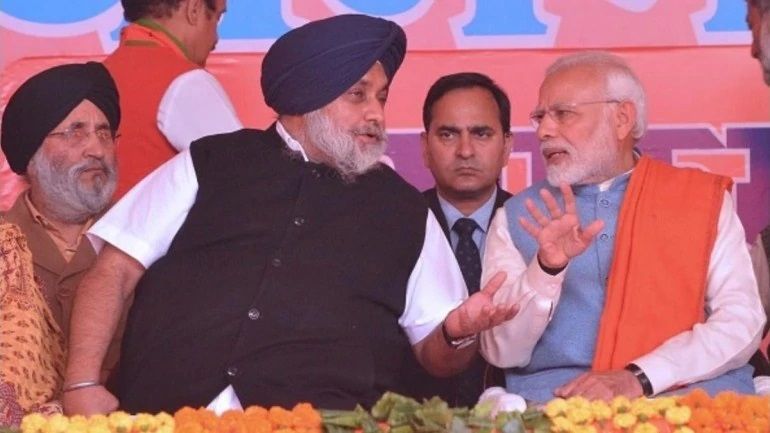Delhi assembly poll: What's behind the Akali Dal-BJP split? | India Today Insight

Barely days after opposing a resolution in the Punjab assembly against the Citizen (Amendment) Act (CAA), the Shiromani Akali Dal (SAD) snapped its alliance with the BJP for the Delhi assembly election next month. The Congress government in Punjab, led by Chief Minister Amarinder Singh, had moved the resolution, condemning CAA as "divisive" and against the spirit of a "free and fair democracy".
Though the SAD opposed the resolution in the assembly, it favoured the inclusion of Muslims among groups eligible for citizenship under the new law-a tightrope walk on the issue that sparked a difference of opinion with ally BJP.
While the SAD's decision not to ally with the BJP is hardly expected to determine the BJP's fortunes in the Delhi election, it may impact their ties in Punjab. In the 2013 Delhi poll, the SAD contested four seats on the BJP's symbol, winning three. In 2015, the party lost all three seats. In 2017, SAD leader Manjinder Singh Sirsa won the bypoll for the Rajouri Garden seat to re-enter the Delhi assembly.
A BJP leader said that the SAD wanted to contest two seats--Rajouri Garden and Harinagar--on its own symbol and two seats--Shahdara and Kalkaji--on the BJP's symbol. But the BJP insisted that the SAD contest all four seats on its own symbol. The SAD was not agreeable to this.
Traditionally, the SAD has commanded influence in 7-9 constituencies in Delhi. The anti-Badal Akali groups have approached the BJP to fill in for the SAD's exit.
The SAD has also joined the opposition chorus against the proposed countrywide National Register of Citizens (NRC) exercise. Sirsa said that in the last three Delhi election-related meetings with the BJP, his party was asked to reconsider its stand on the CAA. "The SAD refused. The party was firm that Muslims could not be left out of the CAA," he said.
Amarinder Singh, however, made light of the SAD's decision, daring the party to quit the ruling National Democratic Alliance at the Centre to prove that its concerns over CAA were genuine.
The BJP's election strategy for Delhi includes a series of neighbourhood meetings beginning January 24. A group of 30 prominent leaders has been identified, who will be addressing gatherings of 100-150 people and explaining the concepts of CAA, NRC and NPR (National Population Register). "BJP national president J.P. Nadda, home minister Amit Shah, BJP chief ministers Yogi Adityanath, JaiRam Thakur and Trivendra Singh Rawat, and some former chief ministers will be among those holding the meetings," says a top BJP leader.
The BJP has allotted ally Janata Dal-United two seats in Delhi while the Lok Janshakti Party has been given one seat.
For the SAD, the compulsion to harden its stance on CAA and NRC comes from various reasons. First, Amarinder Singh's hawkish position on the issue. Apart from getting the resolution passed in the state assembly on January 17, the Punjab chief minister declared that his state will join Kerala and other litigants opposing the CAA in the Supreme Court. Second, the extremist Sikh lobby in Punjab views the CAA and NRC as an 'RSS-BJP plot to target extremist communities'. Third, though they make up less than 2 per cent of the population, Muslims in Punjab are swing voters and don't have loyalties towards any particular political party. Fourth, the temporal seat of the Ahmadiyya Muslims is in Qadianin the state's Gurdaspur district, and members of the community are facing persecution in Pakistan.
Both the Congress and the SAD are eyeing these vote bases with a view to the 2022 assembly election. In the 2017 assembly election, a large chunk of the extremist Sikh and Panthic votes went to the Aam Aadmi Party (AAP). With the AAP going downhill in Punjab, the Congress and SAD want to capture these votes.
A section of the SAD cadre is of the view that not only the CAA, the party should have also taken a tough stance against the abrogation of Article 370 of the Constitution last August, which stripped Jammu and Kashmir of its special status. The SAD is also apprehensive that party rebels, under Rajya Sabha MP Sukhdev Singh Dhindsa, may woo its traditional vote-banks.
The SAD's opposition to CAA, though, raises some pertinent questions. Why did Harsimrat Kaur Badal, the SAD representative in the Union cabinet, not register her protest against the Citizenship (Amendment) Bill in cabinet meetings and why did the party vote in favour of the CAA in Parliament? The SAD leadership may have to offer answers to these in the days to come.





























































Comments
Test name February 19, 2016 Reply
There are many variations of passages of Lorem Ipsum available, but the majority have suffered alteration in some form, by injected humour, or randomised words which don't look even slightly believable. If you are going to use a passage of Lorem Ipsum, you need to be sure there isn't anything embarrassing hidden in the middle of text.
Test name February 19, 2016
Lorem ipsum dolor sit amet, consectetur adipiscing elit, sed do eiusmod tempor incididunt ut labore et dolore magna aliqua.
Test name February 19, 2016Reply
Lorem ipsum dolor sit amet, consectetur adipiscing elit, sed do eiusmod tempor incididunt ut labore et dolore magna aliqua. Lorem ipsum dolor sit amet, consectetur adipiscing elit, sed do eiusmod tempor incididunt ut labore et dolore magna aliqua.